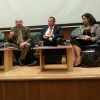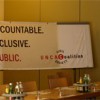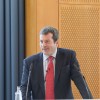We understand that The Middle East and North Africa finds itself in a very complex situation with major challenges to its stability, security and development. In that context we articulate four key messages to improve the governance indicators for Jordan. These messages are addressed to the government, the civil society organisations and the private sector. […]

Why did Transparency International visit Jordan?

On the frontline against corruption in Europe
Last Friday, Cobus de Swardt, Managing Director of the global Transparency International Secretariat in Berlin, was visiting Brussels for an interview in the Euronews show “On the Frontline” (OTFL) for a special edition titled “Is there a corruption crisis in Europe?” which aired yesterday. The discussions around this show started already back in August when OTFL […]

Why we need a global convention against corruption
Governmental and UN representatives responsible for enforcement of the 2003 UN Convention against Corruption met in Vienna two months ago to discuss the process for reviewing implementation of anti-corruption measures. Below is an excerpt of a speech that Ifthekar Zaman, Executive Director of TI Bangladesh, gave. Like many other TI Chapters around the world we […]

Public procurement: Keeping government spending corruption-free
Transparency International’s Annual Report highlights work from more than 100 countries around the world. The following extract looks at what TI chapters are doing to keep spending on government services clean and transparent. Trillions of dollars are spent every year worldwide on publicly funded projects – everything from schools and hospitals, to roads and bridges, […]

Corruption: a crime against society
The following is an excerpt from the collected papers of the Rencontres Economiques d’Aix-en-Provence 2011. Read the full article here. Corruption is often thought of as an economic or “white collar crime”. That ignores the greater implications of corruption, the abuse of power at the expense of the many, which perpetuates social injustice and the […]
- State Capture in South Africa 14 February 2017
-
 What’s next for Ukraine?
16 December 2016
What’s next for Ukraine?
16 December 2016
-
 Cleaning up sport: conflicts of interest at the top
9 December 2016
Cleaning up sport: conflicts of interest at the top
9 December 2016
-
 OGP: France must do more to tackle corruption
9 December 2016
OGP: France must do more to tackle corruption
9 December 2016
-
 Pharma companies in Slovakia: Uncovering conflicts of interest
9 December 2016
Pharma companies in Slovakia: Uncovering conflicts of interest
9 December 2016
-
Nokubonga Ndima: Young people can make a change for a better future...
-
Benjamin M: Very good article! Congrats!...
-
arun kottur: In India sports minister was involved decades are ...
-
Ekonomi: Very beneficial article. Thank you very much. htt...
-
ksweeney1: I do not agree that https://apex.aero/2016/09/22/g...
Search
Categories
Latest news from Transparency International
No items, feed is empty.

 Connect with us on Facebook
Connect with us on Facebook Follow us on Twitter
Follow us on Twitter